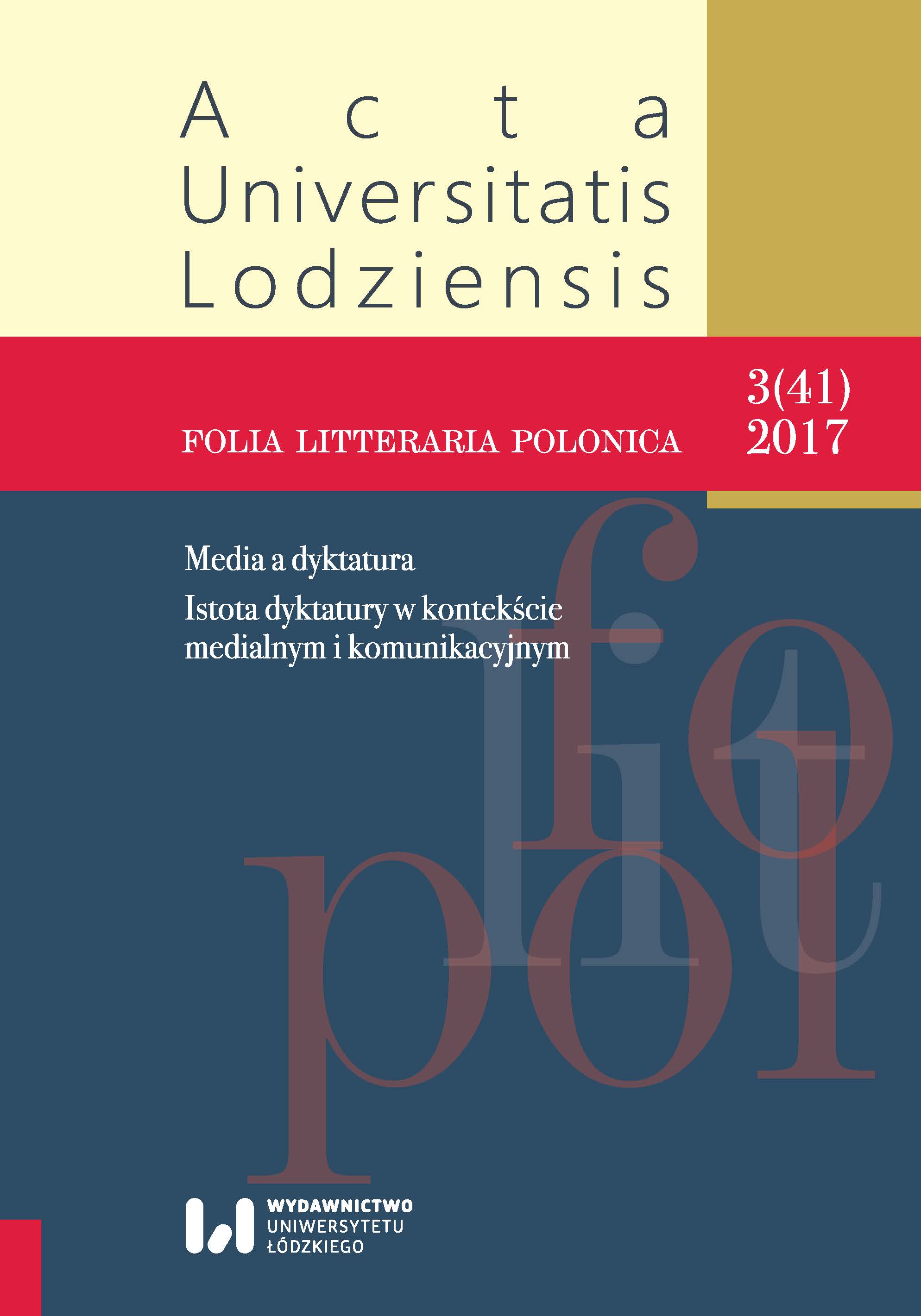Hermanna Brocha analiza faszyzmu
DOI:
https://doi.org/10.18778/1505-9057.41.01Słowa kluczowe:
Hermann Broch, fascism, Platonic idealism, myth, Adolf HitlerAbstrakt
Like many other German-speaking writers, Hermann Broch was forced to emigrate from Nazi Germany at the end of the 1930s. It was partly due to the criticism of the fascist movement that he had presented in the then-titled Bergroman [Mountain Novel], which took its final shape as Der Versucher [The Seducer] and was published posthumously under the title The Spell [Die Verzauberung]. Another novel depicting the development of fascism is Broch’s Die Schuldlosen: Ein Roman in elf Erzählungen [The Guiltless Ones. A Novel in Eleven Stories]. Broch also wrote Adolf Hitler’s Farewell Address, an essay that can be read as a sort of completion to the abovementioned books since it providesan even more directinsight into the Nazi mind, portraying it from within. In his works, Hermann Broch describes spiritual as well as specifically social roots of fascism: any autocratic movement characterized by the rejection of Platonic idealism and thus, inevitably, of the Christian tradition itself.
Pobrania
Bibliografia
Broch H., Die Verzauberung, wyd. P.M. Lützeler, Suhrkamp Verlag, Frankfurt am Main 1994 [Kommentierte Werkausgabe, Bd. 3].
Google Scholar
Broch H., Głosy 1933, [w:] Broch H., Niewinni. Powieść w jedenastu opowiadaniach, przeł. W. Jedlicka, wiersze przeł. W. Wirpsza, Czytelnik, Warszawa 1961.
Google Scholar
Broch H., Kusiciel, przeł. E. Sicińska, Czytelnik, Warszawa 1970.
Google Scholar
Broch H., Ostatni wybuch manii wielkości. Mowa pożegnalna Hitlera, przeł. M. Ganczar, „Odra” 2008, nr 5, s. 39–44.
Google Scholar
Broch H., Posłowie, [w:] Broch H., Niewinni, przeł. W. Jedlicka, Czytelnik, Warszawa 1961, s. 459–465.
Google Scholar
Broch H., Życie bez idei platońskiej, [w:] Broch H., Kilka uwag o kiczu i inne eseje, przeł. J. Garewicz, Czytelnik, Warszawa 1998, s. 160–166.
Google Scholar
Goethe J.W., Faust, InselVerlag, Leipzig 1941 [przeł. Feliks Konopka, objaśnienia S. Lichański, PIW, Warszawa 1984.] The City of Man: A Declaration of World Democracy, Viking Press, New York 1941.
Google Scholar
Adler A., Praxis und Theorie der Individualpsychologie, J.F. Bergmann Verlag, München-Wiesbaden 1920.
Google Scholar
Arendt H., Der Dichter wider Willen, [in:] H. Broch, Dichten und Erkennen. Essays I, RheinVerlag, Zürich 1995, s. 5–42.
Google Scholar
Blumenberg H., Praca nad mitem, przeł. K. Najdek, M. Herer, Z. Zwoliński, Wydawnictwo Oficyna Naukowa, Warszawa 2009.
Google Scholar
Burke K., A Rhetoric of Motives, University of California Press, Berkeley 1950.
Google Scholar
Durzak M., Hermann Broch, Rowohlt Verlag, Reinbek bei Hamburg 1966.
Google Scholar
Frankfurt H., O wciskaniu kitu, przeł. H. Pustuła, Wydawnictwo Czuły Barbarzyńca, Warszawa 2008.
Google Scholar
Ganczar M., Historia literatury austriackiej, Wydawnictwo Naukowe PWN, Warszawa 2016.
Google Scholar
Le Bon G., Psychologia tłumu, przeł. B. Kaprocki, Wydawnictwo Marek Derewiecki, Warszawa 2007.
Google Scholar
Lichański J.Z., Hermann Broch, Wydawnictwo Semper, Warszawa 1994.
Google Scholar
Lützeler P.M., Hermann Broch: eine Biographie, Suhrkamp Verlag, Frankfurt am Main 1985.
Google Scholar
Riklin F., Wunscherfüllung und Symbolik im Märchen, Deuticke Verlag, Leipzig 1908.
Google Scholar
Sighele S., Tłum zbrodniczy. Szkic psychologii zbiorowej, przeł. A. Morżkowska, C. Centnerszwer, Warszawa 1895.
Google Scholar
Spencer H., Pierwsze zasady, przeł. J.K. Potocki, nakład Redakcji Tygodnika „Głos”, Warszawa 1886.
Google Scholar
Veihinger H., Die Philosophie des Als Ob. System der theoretischen, praktischen und religiösen Fiktionen der Menschheit auf Grund eines idealistischen Positivismus. Mit einem Anhang über Kant und Nietzsche, Felix Meiner Verlag, Leipzig 1927.
Google Scholar
Pobrania
Opublikowane
Jak cytować
Numer
Dział
Licencja

Utwór dostępny jest na licencji Creative Commons Uznanie autorstwa – Użycie niekomercyjne – Bez utworów zależnych 4.0 Międzynarodowe.











